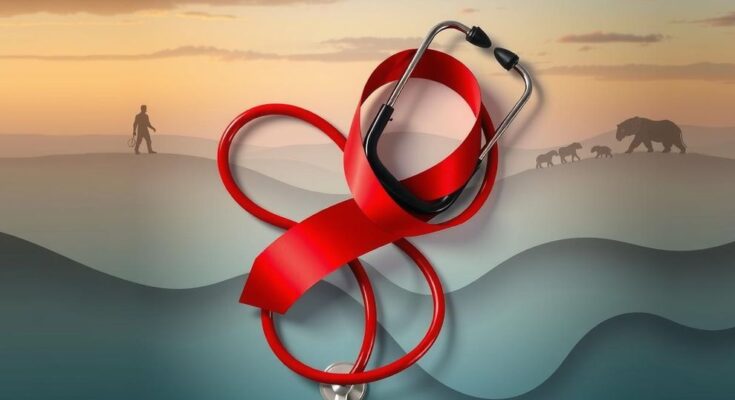U.S. funding cuts to HIV/AIDS programs in Africa are predicted to result in substantial increases in mortality rates, particularly in South Africa. Experts warn of the dire consequences such as the loss of critical services and health facilities, impacting millions. The cuts have disrupted antiretroviral therapies and spurred calls for alternative funding from other nations and private organizations to fill the gaps.
Recent U.S. funding cuts to HIV/AIDS programs in Africa have raised alarm among health experts, with projections indicating that these reductions could lead to significant mortality rates. In South Africa, it is estimated that up to 500,000 individuals could die over the next decade due to halted funding, as reported by officials from the Desmond Tutu HIV Center.
Since January 20, the Trump administration enacted substantial cuts to foreign aid initiatives, specifically targeting the U.S. Agency for International Development (USAID) and the United Nations’ HIV/AIDS program, UNAIDS. These changes have adversely affected numerous countries, with 55 reporting funding reductions to essential HIV interventions.
The U.S. has historically financed two-thirds of international HIV assistance in developing nations. In South Africa, where 7.5 million individuals are living with HIV, programs supported by the U.S. have led to a 66% reduction in AIDS-related deaths since 2010. PEPFAR funding accounts for approximately 17% of South Africa’s HIV budget, directly impacting millions who rely on antiretroviral therapies.
The cessation of funding has already disrupted vital services across the continent. Reports indicate closures of clinics, withdrawal of support for community health workers, and cessation of vital research projects. Countries like South Africa, Ivory Coast, Botswana, Mozambique, and Tanzania have all seen adverse effects, limiting access to critical care.
In response, some African nations are attempting to mitigate the crisis. The South African government pledged initiatives to stabilize the healthcare system, while Nigeria has allocated funds to purchase HIV treatment packs. However, the cancellation of U.S. contributions has left a substantial gap in the support required for ongoing healthcare delivery.
To address these funding shortfalls, experts advocate for increased contributions from other nations, particularly within the European Union, and for private entities like the Bill and Melinda Gates Foundation to enhance their financial support for HIV initiatives. Nevertheless, the future remains uncertain as reliance on the U.S. financial framework diminishes.
The discontinuation of U.S. funding for HIV/AIDS programs in Africa poses a significant threat to public health, threatening the lives of millions. While countries make efforts to adapt and seek alternative funding sources, the profound impact of these cuts could result in hundreds of thousands of preventable deaths. The need for collective international action and commitment to sustaining HIV healthcare services is critical to avert a potential health crisis.
Original Source: www.aljazeera.com




